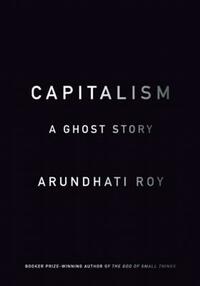Take a photo of a barcode or cover
Indrukwekkende vertelling van de effecten van het kapitalisme in India
"The transformation of the idea of justice into the industry of human rights has been a conceptual coup in which NGOs and foundations have played and crucial part. The narrow focus on human rights enables an atrocity-based analysis in which the larger picture can be blocked out and both parties in a conflict -- say for example the Maoists and the Indian government, or the Israeli army and Hamas -- can both be admonished as Human Rights Violators... This is not to suggest that human rights don't matter. They do, but they are not a good enough prism through which to view or remotely understand the great injustices in the world we live in." pg. 32
"Martin Luther Kind Jr. made the forbidden connections between Capitalism, Imperialism, Racism, and the Vietnam War. As a result, after he was assassinated even his memory became toxic, a threat to public order. Foundations and corporations worked hard to remodel his legacy to fit a market-friendly format. The Martin Luther King Jr. Center for Nonviolent Social Change, with an operational grant of $2 million, was set up by, among others, the Ford Motor Company, General Motors, Mobil, Western Electric, Proctor and Gamble, US Steel, and Monsanto." pg. 36
"...Whether it works or not depends on how we view corruption. Is corruption just a matter of legality, or financial irregularity and bribery, or is it the currency of a social transaction in an egregiously unequal society, in which power continues to be concentrated in the hands of a smaller and smaller minority?" pg. 46
"Somewhere along the way, Capitalism reduced the idea of justice to mean just "human rights," and the idea of dreaming of equality became blasphemous." pg. 86
"Martin Luther Kind Jr. made the forbidden connections between Capitalism, Imperialism, Racism, and the Vietnam War. As a result, after he was assassinated even his memory became toxic, a threat to public order. Foundations and corporations worked hard to remodel his legacy to fit a market-friendly format. The Martin Luther King Jr. Center for Nonviolent Social Change, with an operational grant of $2 million, was set up by, among others, the Ford Motor Company, General Motors, Mobil, Western Electric, Proctor and Gamble, US Steel, and Monsanto." pg. 36
"...Whether it works or not depends on how we view corruption. Is corruption just a matter of legality, or financial irregularity and bribery, or is it the currency of a social transaction in an egregiously unequal society, in which power continues to be concentrated in the hands of a smaller and smaller minority?" pg. 46
"Somewhere along the way, Capitalism reduced the idea of justice to mean just "human rights," and the idea of dreaming of equality became blasphemous." pg. 86
"The transformation of the idea of justice into the industry of human rights has been a conceptual coup in which NGOs and foundations have played and crucial part. The narrow focus on human rights enables an atrocity-based analysis in which the larger picture can be blocked out and both parties in a conflict -- say for example the Maoists and the Indian government, or the Israeli army and Hamas -- can both be admonished as Human Rights Violators... This is not to suggest that human rights don't matter. They do, but they are not a good enough prism through which to view or remotely understand the great injustices in the world we live in." pg. 32
"Martin Luther Kind Jr. made the forbidden connections between Capitalism, Imperialism, Racism, and the Vietnam War. As a result, after he was assassinated even his memory became toxic, a threat to public order. Foundations and corporations worked hard to remodel his legacy to fit a market-friendly format. The Martin Luther King Jr. Center for Nonviolent Social Change, with an operational grant of $2 million, was set up by, among others, the Ford Motor Company, General Motors, Mobil, Western Electric, Proctor and Gamble, US Steel, and Monsanto." pg. 36
"...Whether it works or not depends on how we view corruption. Is corruption just a matter of legality, or financial irregularity and bribery, or is it the currency of a social transaction in an egregiously unequal society, in which power continues to be concentrated in the hands of a smaller and smaller minority?" pg. 46
"Somewhere along the way, Capitalism reduced the idea of justice to mean just "human rights," and the idea of dreaming of equality became blasphemous." pg. 86
"Martin Luther Kind Jr. made the forbidden connections between Capitalism, Imperialism, Racism, and the Vietnam War. As a result, after he was assassinated even his memory became toxic, a threat to public order. Foundations and corporations worked hard to remodel his legacy to fit a market-friendly format. The Martin Luther King Jr. Center for Nonviolent Social Change, with an operational grant of $2 million, was set up by, among others, the Ford Motor Company, General Motors, Mobil, Western Electric, Proctor and Gamble, US Steel, and Monsanto." pg. 36
"...Whether it works or not depends on how we view corruption. Is corruption just a matter of legality, or financial irregularity and bribery, or is it the currency of a social transaction in an egregiously unequal society, in which power continues to be concentrated in the hands of a smaller and smaller minority?" pg. 46
"Somewhere along the way, Capitalism reduced the idea of justice to mean just "human rights," and the idea of dreaming of equality became blasphemous." pg. 86
Right on and beautifully written. I wish it were longer. Some parts are less accessible due to my lack of sufficient background knowledge on Indian politics.
Scouring polemic against crony capitalism in India. Thought-provoking attack on NGOs and the foundations that fund them
Si les interesa la historia reciente y política de India nada más, pero es muy interesante. SI LES INTERESA ESO.
challenging
informative
inspiring
reflective
fast-paced
This is book is a great read if you want to feel good about...nothing.
As a Canadian I appreciated reading about the struggles of several segments of the Indian population as these stories rarely make it to the news here.
Having read this years after it was initially published, the focus on the Occupy movement was heartbreaking.
As a Canadian I appreciated reading about the struggles of several segments of the Indian population as these stories rarely make it to the news here.
Having read this years after it was initially published, the focus on the Occupy movement was heartbreaking.
informative
reflective
fast-paced





